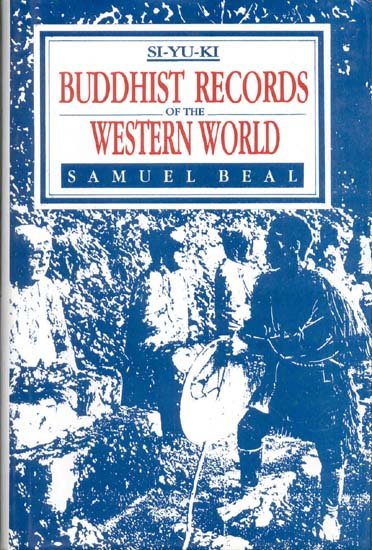Buddhist records of the Western world (Xuanzang)
by Samuel Beal | 1884 | 224,928 words | ISBN-10: 8120811070
This is the English translation of the travel records of Xuanzang (or, Hiuen Tsiang): a Chinese Buddhist monk who traveled to India during the seventh century. This book recounts his documents his visit to India and neighboring countries, and reflects the condition of those countries during his time, including temples, culture, traditions and fest...
Chapter 19 - Country of U-sha (Och)
This kingdom is about 1000 li in circuit; the chief town is about 10 li round. On the south it borders on the river śītā. The soil is rich and productive; it is regularly cultivated and yields abundant harvests. The trees and forests spread their foliage afar, and flowers and fruits abound. This country produces jade of different sorts in great quantities; white jade, black, and green. The climate is soft and agreeable; the winds and rain follow in their season; the manners of the people are not much in keeping with the principles of politeness. The men are naturally hard and uncivilised; they are greatly given to falsehood, and few of them have any feeling of shame. Their language and writing are nearly the same as those of Kie-sha. Their personal appearance is low and repulsive. Their clothes are made of skins and woollen stuffs. However, they have a firm faith in the law of Buddha and greatly honour him. There are some ten saṅghārāmas, with somewhat less than 1000 priests. They study the Little Vehicle according to the school of the Sarvāstivādas. For some centuries the royal line has been extinct. They have no ruler of their own, but are in dependence on the country of K'ie-p'an-t'o.
Two hundred li or so to the west of the city we come to a great mountain. This mountain is covered with brooding vapours, which hang like clouds above the rocks. The crags rise one above another, and seem as if about to fall where they are suspended. On the mountain top is erected a stūpa of a wonderful and mysterious character. This is the old story:—Many centuries ago this mountain suddenly opened; in the middle was seen a Bhikṣu, with closed eyes, sitting; his body was of gigantic stature and his form was dried up; his hair descended low on his shoulders and enshrouded his face. A hunter having caught sight of him, told the king. The king in person went to see him and to pay him homage. All the men of the town came spontaneously to burn incense and offer flowers as religious tribute to him. Then the king said, "What man is this of such great stature?" Then there was a Bhikṣu who said in reply, "This man with his hair descending over his shoulders and clad in a kaṣāya garment is an Arhat who has entered the samādhi which produces extinction of mind. Those who enter this kind of samādhi have to await a certain signal (or period); some say that if they hear the sound of the ghaṇṭā they awake; others, if they see the shining of the sun, then this is a signal for them to arouse themselves from their ecstasy; in the absence of such signal, they rest unmoved and quiet, whilst the power of their ecstasy keeps their bodies from destruction. When they come from their trance after their long fast, the body ought to be well rubbed with oil and the limbs made supple with soft applications; after this the ghaṇṭā may be sounded to restore the mind plunged in samādhi." The king said, "Let it be done," and then he sounded the gong.
Scarcely had the sound died away, but the Arhat, recognising the signal, looking down on them from on high for a long time, at length said, "What creatures are you with forms so small and mean, clothed with brown robes?" They answered, "We are Bhikṣus!" He said, "And where now dwells my master, Kāśyapa Tathāgata?" They replied, "He has entered the great nirvāṇa for a long time past." Having heard this, he shut his eyes, as a man disappointed and ready to die. Then suddenly he asked again, "Has śākya Tathāgata come into the world?" "He has been born, and having guided the world spiritually, he has also entered nirvāṇa." Hearing this, he bowed his head, and so remained for a long time. Then rising up into the air, he exhibited spiritual transformations, and at last he was consumed by fire and his bones fell to the ground. The king having collected them, raised over them this stūpa.
Going north from this country, and traversing the rocky mountains and desert plains for 500 li or so, we come to the country of Kie-sha.
